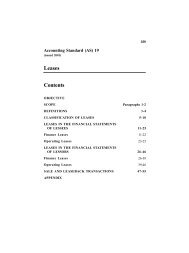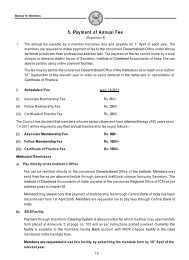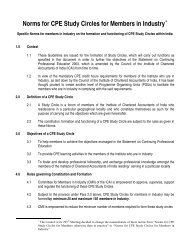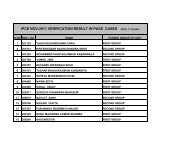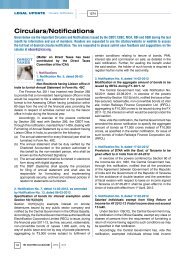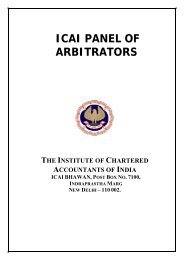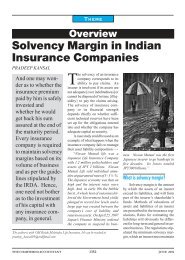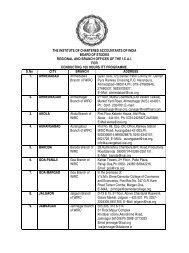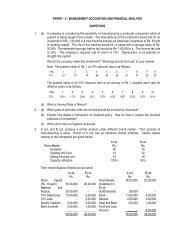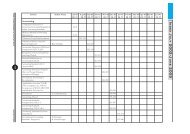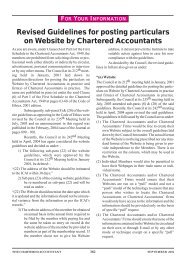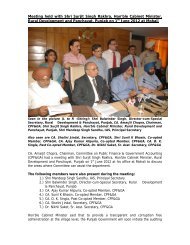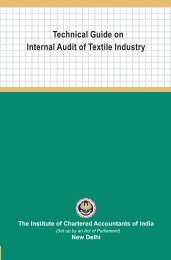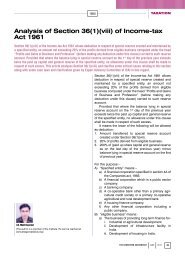The Chartered Accountant
The Chartered Accountant
The Chartered Accountant
You also want an ePaper? Increase the reach of your titles
YUMPU automatically turns print PDFs into web optimized ePapers that Google loves.
tanks as WIP and capitalise<br />
the nickel and nickel sulphamate<br />
solution in the new<br />
6 tanks during the financial<br />
year 2007-08.<br />
(v) In case the nickel and nickel<br />
sulphamate solution, in respect<br />
of 12 old tanks, is to<br />
be capitalised, whether the<br />
Income-tax Department will<br />
permit depreciation thereon.<br />
C. Points considered by the Committee<br />
6. <strong>The</strong> Committee notes the definition<br />
of the term ‘fixed asset’ as given<br />
in paragraph 6.1 of Accounting<br />
Standard (AS) 10, ‘Accounting for<br />
Fixed Assets’, as reproduced below.<br />
<strong>The</strong> Committee also notes the definition<br />
of the term ‘inventories’ and<br />
paragraph 4 of Accounting Standard<br />
(AS) 2, ‘Valuation of Inventories’,<br />
which state as follows:<br />
AS 10<br />
“6.1 Fixed asset is an asset held<br />
with the intention of being used<br />
for the purpose of producing or<br />
providing goods or services and<br />
is not held for sale in the normal<br />
course of business.”<br />
AS 2<br />
“Inventories are assets:<br />
(a) held for sale in the ordinary<br />
course of business;<br />
(b) in the process of production<br />
for such sale; or<br />
(c) in the form of materials<br />
and supplies to be consumed<br />
in the produc-<br />
OPINION<br />
tion process or in the<br />
rendering of services.”<br />
“4. …Inventories also encompass<br />
finished goods produced, or<br />
work in progress being produced,<br />
by the enterprise…”<br />
7. <strong>The</strong> Committee further notes the<br />
definition of ‘Work in Process’ as<br />
contained in the Guidance Note on<br />
Terms Used in Financial Statements,<br />
issued by the Institute of <strong>Chartered</strong><br />
<strong>Accountant</strong>s of India, which provides<br />
as follows:<br />
“Work in Process includes all<br />
materials which have undergone<br />
manufacturing or processing operations,<br />
but upon which further<br />
operations are necessary before<br />
the product is ready for sale.”<br />
8. <strong>The</strong> Committee notes from the<br />
Facts of the Case that the initial<br />
nickel and nickel sulphamate solution<br />
put into the tank get consumed<br />
in the production process through<br />
electroplating and are not held as<br />
such for producing the goods, as in<br />
the case of fixed assets. <strong>The</strong> quantity<br />
of nickel and nickel sulphamate<br />
solution in the tank have to be replenished<br />
by way of fresh additions<br />
in order to continue the production<br />
process and thus, it is only the<br />
quantity of initial nickel and nickel<br />
sulphamate solution that stays in the<br />
tank for its entire life and not the one<br />
originally put into the tank. Accordingly,<br />
the contention of the querist<br />
in paragraph 4 above to capitalise<br />
the cost of initial nickel and nickel<br />
sulphamate solution on this ground<br />
is not valid. Thus, the Committee<br />
is of the view that the initial nickel<br />
and nickel sulphamate solution that<br />
are contained in the tank are of the<br />
nature of work-in-progress to be<br />
disclosed as inventory.<br />
D. Opinion<br />
9. On the basis of the above, the<br />
Committee is of the following opinion<br />
on the issues raised in paragraph<br />
5 above:<br />
(i) No, the accounting treatment<br />
given by the company to treat<br />
the cost of initial nickel and<br />
nickel sulphamate solution in<br />
the six new tanks, acquired in<br />
the financial year 2007-08, as<br />
capital expenditure is not correct.<br />
(ii) Since the answer to the above<br />
question is not in the affirmative,<br />
the answer to this question<br />
does not arise.<br />
(iii) Since the answer to (i) above<br />
is not in the affirmative, the<br />
answer to this question does<br />
not arise.<br />
(iv) No, the company cannot<br />
adopt dual accounting policy<br />
for similar items purchased at<br />
different points of time.<br />
(v) Answer to this question does<br />
not arise as the cost of nickel<br />
and nickel sulphamate solution<br />
is not to be capitalised.<br />
In any case, as per Rule 2 of<br />
the Advisory Service Rules,<br />
in accordance with which the<br />
Committee replies to the queries<br />
received, the Committee<br />
does not answer the issues involving<br />
legal interpretation of<br />
various enactments, such as,<br />
the Income-tax Act, 1961.q<br />
1. <strong>The</strong> Opinion is only that of the Expert Advisory Committee and does not necessarily represent the Opinion of the<br />
Council of the Institute.<br />
2. <strong>The</strong> Compendium of Opinions containing the Opinions of Expert Advisory Committee has been published in twenty<br />
five volumes which are available for sale at the Institute's office at New Delhi and its regional council offices at Mumbai,<br />
Chennai, Kolkata and Kanpur.<br />
3. Recent opinions of the Committee are available on the website of the Institute at URL: http://www.icai.org/category.<br />
html?c_id=146<br />
THE CHARTERED ACCOUNTANT 977 DECEMBER 2008



